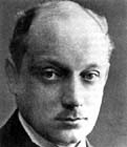|
 Born November
25, 1878, in Magdeburg, Germany, Georg Kaiser was to become the
leader of the expressionist movement in theatre which called
for the expression of the inner experience rather than the outer
reality, or rather the expression of reality as distorted by
the writer's own inner experience. The movement opened the door
for all manner of new techniques including juxtaposition of fantasy
and reality, rapidly shifting scenes, and larger-than-life, dreamlike
characters. Born November
25, 1878, in Magdeburg, Germany, Georg Kaiser was to become the
leader of the expressionist movement in theatre which called
for the expression of the inner experience rather than the outer
reality, or rather the expression of reality as distorted by
the writer's own inner experience. The movement opened the door
for all manner of new techniques including juxtaposition of fantasy
and reality, rapidly shifting scenes, and larger-than-life, dreamlike
characters.
Kaiser wrote his first plays during a lengthy convalescence.
They were labeled "games of ideas" by the critic Julius
Bab. His first real success came with The Burghers of Calais,
an appeal for peace which was written in 1913, but not performed
until 1917 during the height of World War I. Also produced that
year was From Morn to Midnight (1917), a popular piece
in which Kaiser satirized the cheapness and futility of modern
society. His hero, a kind of machine-age Everyman, searches everywhere
for some kind of fulfillment--in commercial sex, in salvationist
religion--but discovers through a series of nightmarish episodes
that the world is deceitful and illusory. In the end, disillusioned
and pursued by the police, he takes his own life.
In Kaiser's famous trilogy of plays--Coral (1917),
Gas I (1918), and Gas 2 (1920)--he once again creates
an Everyman who tries desperately to convince workers to trade
in their hollow, meaningless jobs at the gas company for life
in a green-field settlement. The workers, however, turn a deaf
ear to his pleas. In the end, the hero's son discovers that the
plant is producing poison gas, and attempting to follow in his
father's footsteps, destroys the plant in a huge explosion. The
trilogy painted an effective expressionist picture of modern
civilization--hollow, mechanized, overcome with opportunistic
greed, and rushing headlong towards its own destruction.
In 1938, the Nazis banned Kaiser's plays, and he went into
exile in Switzerland. Although he abandoned expressionism, he
continued to write, most notably, The Raft of the Medusa (1945),
based on an actual occurrence which had been reported in the
Swiss papers, in which 13 children on a little raft drown the
youngest to avoid bad luck. Kaiser died on June 4, 1945, in Ascona,
Switzerland. He left behind more than 60 plays including The
Phantom Lover (1928), The Tsar Has His Photo Taken
(1928) with music by Kurt Weill, Two Ties (1929) with
music by Mischa Spoliansky, Silverlake (1933) also with
music by Kurt Weill, The Gardener of Toulouse (1938),
and Alain und Elise (1940).
- Search eBay! for Georg Kaiser collectibles

|